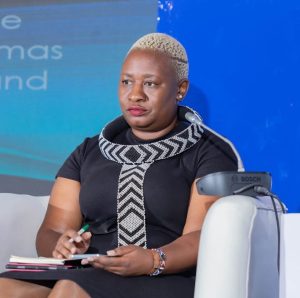 Article By Ruvimbo Nyikadzino
Article By Ruvimbo Nyikadzino
Insights from the Disability Responsive Policymaking Forum: ‘Exploring Solutions, Strategies, and Opportunities’ featuring contributions from Samantha Sibanda, Human Rights Advocate and Sandra Nhapi, City of Harare Gender Focal Person.

Samantha Sibanda, Human Rights Advocate
Individuals with disabilities in Zimbabwe encounter substantial barriers when attempting to access essential services such as education, healthcare, employment and social opportunities. The root of these challenges lies in deeply ingrained systemic discrimination, pervasive stigma, and inadequate accessibility measures. Consequently, this has severely impacted their overall quality of life, hindering their ability to reach their full potential and participate fully in society.
The inclusion of people with disabilities in policy-making processes is crucial to ensure that their unique needs and perspectives are adequately represented and addressed. The Women’s Democracy Network (WDN-ZW) forum has aptly emphasized the importance of involving persons with disabilities in policy decisions, as well as tackling accessibility barriers during consultations. By doing so, policymakers can foster more inclusive and effective policies that cater to the diverse needs of all citizens, ultimately promoting greater social equity and empowerment.

Sandra Nhapi, City of Harare Gender Focal Person
According to the World Health Organization (WHO), approximately 15% of the global population lives with some form of disability (WHO, 2021). In Zimbabwe, the national population census revealed that around 5% of the population has a disability, although this figure is likely an underestimate due to methodological limitations in data collection (Zimbabwe National Statistics Agency, 2022).
This discrepancy highlights the pressing need for more robust and inclusive data collection and analysis methods. By gathering accurate and comprehensive data, policymakers can develop targeted interventions and policies that effectively address the unique needs of persons with disabilities, ultimately promoting greater inclusivity and equity.
In June 2021, Zimbabwe launched its National Disability Policy, developed with support from various stakeholders, including the United Nations. This policy aims to address the marginalization and discrimination faced by persons with disabilities (PWDs) while empowering them to enhance their quality of life. However, despite this progress, more efforts are needed to effectively implement this framework and ensure its impact is felt by those it is intended to benefit.
The WDN-ZW forum discussion revealed that discrimination against persons with disabilities often stems from attitudinal barriers rather than resource constraints, highlighting the need for a paradigm shift in policy-making processes. This finding aligns with existing literature, which indicates that negative attitudes and stigma towards persons with disabilities are significant obstacles to inclusion (Barnes, 2011).
Therefore, policymakers must prioritize awareness-raising and training programs to foster a more inclusive and accepting environment, ultimately promoting the full participation of persons with disabilities in society.
The City of Harare’s disability policy is a positive step towards promoting inclusivity, but further efforts are necessary to guarantee full accessibility and meaningful participation in policy-making processes. The commitment to provide Braille versions of policies, sign language interpretation during council meetings, and assistance with policy implementation is laudable.
Nevertheless, the policy’s success will hinge on its effective implementation, as well as the degree to which it is informed by the lived experiences and needs of persons with disabilities. To ensure the policy’s impact is lasting, it is crucial that the city continues to engage with and involve persons with disabilities in all stages of policy development and implementation.
The pillars of inclusion physical, digital and programmatic accessibility are crucial to ensuring that policies benefit all citizens. Effective communication is pivotal to this process, and policymakers must prioritize the development of comprehensive communication strategies that cater to diverse needs. This includes providing information in accessible formats, such as Braille, large print, and audio descriptions, as well as ensuring that public consultations are accessible and inclusive for all individuals, including those with disabilities.
The United Nations Convention on the Rights of Persons with Disabilities (CRPD) underscores the significance of accessibility and inclusion in all facets of life (United Nations, 2006). Article 9 of the CRPD mandates that states take suitable measures to ensure persons with disabilities have access to information and communication technologies, including the internet and other electronic communication services. To uphold this commitment, policymakers must prioritize the implementation of accessible technologies and design public services that cater to the diverse needs of persons with disabilities, thereby promoting equal participation and opportunities.
Disability responsive policymaking is a crucial step towards creating a more inclusive and accessible society. To achieve this, policymakers must prioritize the needs and rights of persons with disabilities, recognizing that their lived experiences, perspectives, and feedback are essential in shaping policies that cater to their diverse needs. This can be accomplished through collaborative efforts with organizations of persons with disabilities, conducting accessibility audits to identify and address physical and digital barriers, and providing training on disability awareness to promote empathy and understanding.
By working together, we can create a more equitable and inclusive society where everyone has the opportunity to participate, contribute and thrive. This collaborative effort involves governments, civil society, organizations, and individuals coming together to promote disability inclusion and accessibility. By doing so, we can unlock the full potential of all citizens, regardless of their abilities and foster a society that values diversity and promotes social justice.
